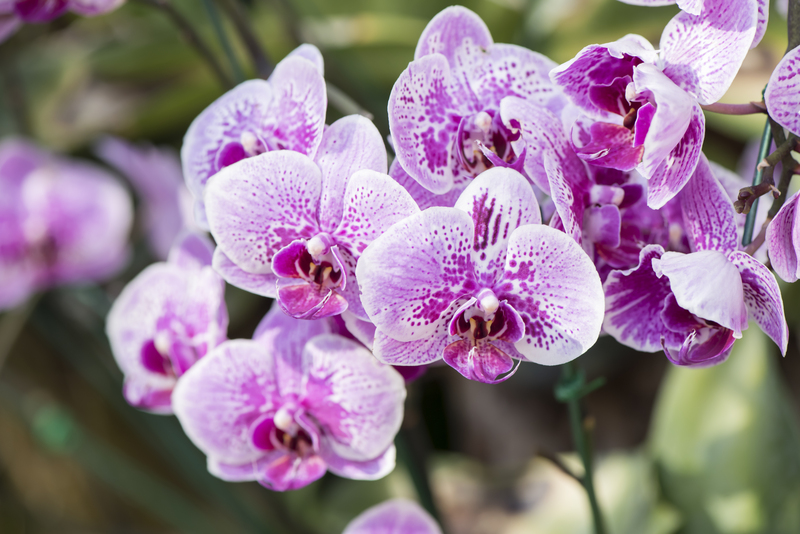Discover 3 Masterful Tips for Effortless Weed Control
Posted on 27/05/2025
Dealing with pesky weeds is a never-ending task for gardeners and homeowners alike. Whether you're an avid vegetable grower, a proud lawn keeper, or simply want a pristine landscape, effective weed control is essential. The key to successful weed management lies in working smarter, not harder. By implementing a masterful strategy, you can enjoy a lush, thriving garden with minimal effort. In this article, we'll unveil three expert tips for mastering weed control and keep your outdoor spaces healthy and beautiful all season long.
Why Is Weed Control Important?
Weeds don't just ruin the aesthetics of your garden or yard -- they also compete with your desirable plants for water, light, and nutrients. Persistent weed problems can choke out flowers, vegetables, and lawns, leading to stunted growth or even plant death. Moreover, some weeds can harbor pests and diseases that spread quickly to other plants. That's why effortless and efficient weed management is a crucial part of successful gardening.

3 Masterful Tips for Effortless Weed Control
1. Start With Prevention: Mulching the Smart Way
Mulching is one of the most effective and easy ways to maintain a weed-free garden. By covering your soil with mulch, you block sunlight from reaching weed seeds, which prevents their germination and stunts their growth.
- Organic Mulches: Use materials such as shredded bark, wood chips, grass clippings, or straw. These not only suppress weed growth but also enrich the soil as they decompose. Apply a 2-4 inch layer around your plants, making sure to leave space around stems to avoid rot.
- Inorganic Mulches: Landscape fabric, black plastic sheeting, or gravel are excellent for long-term weed suppression in high-traffic areas, under pathways, or in perennial beds. These materials don't add nutrients to the soil, but their weed-control power is unmatched when installed properly.
A masterful tip: For vegetable gardens and flower beds, use a combination of organic mulch over landscape fabric. This dual method boosts your defense against stubborn weeds and keeps your garden looking tidy all season long.
Benefits of Using Mulch for Weed Management
- Blocks sunlight, reducing weed seed germination
- Helps soil retain moisture
- Keeps roots cool and minimizes erosion
- Improves soil texture and nutrient content
- Gives gardens a well-maintained appearance
2. Master the Art of Early Intervention
Timing is everything in the fight against weeds. Regular and early removal is far more efficient than trying to tackle large, mature weed infestations. Here's how you can stay one step ahead of unwanted plants:
- Weed Early and Often: Aim to weed your garden at least once a week during the growing season. Young weeds are much easier to pull out because their roots are shallow and they haven't had time to seed.
- Water Wisely: Use drip irrigation or soaker hoses to direct water exactly where you need it. By avoiding overhead watering, you minimize the moisture available to weed seeds, which reduces their ability to germinate.
- Remove Weeds Before They Flower: Most weeds spread by seed. If you remove them before they flower, you stop the next generation. Be extra vigilant in spring and early summer, when most weeds go to seed.
- Use Sharp Tools: A trusty hoe, hand weeder, or trowel makes quick work of invasive plants. Choose tools with ergonomic handles to reduce strain on your hands and back.
Expert advice: Pull weeds after rain or watering sessions when the soil is moist. Roots come out easier, reducing the risk of leaving fragments that can regrow.
Early Intervention: What Makes It So Effective?
- Prevents weeds from establishing deep roots
- Cuts the weed life cycle before seed production
- Makes weeding quicker and less labor-intensive
- Reduces the overall weed seed bank in your soil
3. Choose the Right Plants and Planting Strategies
Plant selection and strategic planting can tip the odds in your favor for natural weed suppression. The aim is to outcompete weeds by creating dense, healthy plantings that leave little room for invaders.
- Densely Plant Your Beds: Arrange your plants close together, according to their mature size recommendations. As they grow, their leaves will shade the ground, making it tough for weed seeds to get the light they need to sprout.
- Use Ground Covers: Fast-growing ground cover plants like creeping thyme, clover, or pachysandra form a "living mulch," blocking sunlight and crowding out weeds. In lawns, overseed thin patches to improve turf density, which naturally fights off broadleaf weeds and crabgrass.
- Rotate Crops: In vegetable gardens, practice crop rotation each year. Different families of crops can disrupt weed growth cycles and help minimize soil-borne weed seeds.
- Embrace Native Plants: Native perennials are well adapted to local conditions and tend to be more vigorous than weeds. They establish quickly, require less maintenance, and often crowd out invasive species.
Bonus master tip: Interplanting tall and short plants creates layers of shade, further reducing the open spaces where weeds thrive. Marigolds, nasturtiums, and calendula are beautiful, fast-growers that fill gaps in vegetable or flower beds--adding color and natural weed resistance.
Smart Planting: Building a Weed-Suppressing Ecosystem
- Thick plantings choke out weed competition
- Ground covers provide beautiful, low-care solutions
- Crop rotation confuses and disrupts weeds
- Native plants leverage natural hardiness
Frequently Asked Questions About Weed Control
What is the best way to control weeds organically?
Organic weed management combines physical barriers like mulch, manual weeding, dense planting, and smart watering techniques. Refrain from using synthetic herbicides in favor of natural solutions--a cornerstone of healthy, sustainable gardens.
Does vinegar kill weeds permanently?
While household vinegar (acetic acid) will scorch young, shallow-rooted weeds, it's less effective on established perennials and may require repeat applications. Take care not to splash vinegar on desirable plants, as it can damage them too.
How can I prevent weeds in my vegetable garden?
Use a combo of landscape fabric under mulch, cultivate fast-growing crops, and weed regularly before seed set. Consider interplanting with green manures or cover crops during the off-season to suppress winter and early spring weed germination.
Are chemical herbicides safe for my garden?
Chemical herbicides can be effective but might harm beneficial soil organisms and desired plants if not used carefully. Always follow label instructions and consider safer, non-toxic alternatives whenever possible.
Additional Masterful Tips for Effortless Weed Management
- Edge your garden beds with a border barrier to physically block the advance of aggressive grasses and lawn weeds.
- Solarize your soil in empty beds by placing clear plastic sheeting over moist soil for 4-6 weeks in summer, which cooks weed seeds before planting time.
- Spot-treat tough weeds with boiling water or a targeted application of organic herbicide on hot, sunny days for best results.
- Maintain healthy soil--nutrient-rich soil helps your desired plants outcompete weeds, creating a self-sustaining landscape that requires less intervention.
- Clean your tools--removing weed seeds from spades, hoes, and gloves ensures you're not accidentally transporting seeds across your garden.

Effortless Weed Control Is Achievable
Mastering weed control is not about using more chemicals or spending hours on your knees. With the right techniques, a little planning, and some regular attention, you can easily enjoy a lush, weed-resistant garden or yard. To summarize:
- Mulch smartly to block sunlight and retain soil health.
- Act early with frequent, strategic weeding before seeds form.
- Choose dense plantings and smart landscaping to naturally outcompete weeds.
By following these three masterful tips for effortless weed control, you'll have the tools and knowledge needed to enjoy a stunning, weed-free outdoor space with minimal fuss. Start implementing these strategies today--and give weeds no chance to take root in your paradise!
Final Thoughts on Effortless Weed Management
Managing weeds doesn't have to be a tiresome chore. Embrace these tried-and-true techniques to create an effective, efficient, and low-maintenance approach to weed control. With a proactive mindset and the right strategies, your landscape will thrive, leaving you more time to enjoy, relax, and be proud of your vibrant, healthy garden.
Ready to take your landscape to the next level? Put these expert weed control tips into action and see the difference for yourself. Happy gardening!

